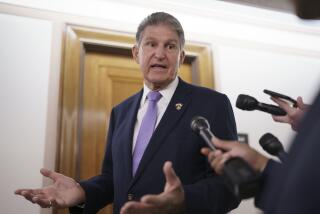Moynihan Sees Health Alliances’ Demise : Insurance: Head of powerful Senate panel has hope for other key elements of Clinton plan. More small businesses may escape employer mandate.
- Share via
WASHINGTON — In another sign that Congress plans major changes in President Clinton’s health care reform proposal, the chairman of the Senate Finance Committee on Sunday almost completely wrote off the prospects for a major component of the initiative: the requirement that virtually all Americans join government-organized purchasing cooperatives.
But Sen. Daniel Patrick Moynihan (D-N.Y.) said the Senate could still pass revised versions of two other pillars of Clinton’s plan: the requirement that employers contribute to health insurance for their employees and price controls on health insurance premiums.
And Moynihan again endorsed Clinton’s contention that the final legislation must provide health care coverage for all Americans--though he signaled that it might take years to phase in.
“That’s non-negotiable as far as I’m concerned,” Moynihan said on the CBS-TV’s “Face the Nation.” “But it doesn’t have to happen on July 1 of next year.”
Moynihan’s comments came three days after House Majority Leader Richard A. Gephardt (D-Mo.) told reporters that the Clinton plan faced major revisions. Like Moynihan, Gephardt indicated that Congress was unlikely to accept Clinton’s proposal for the cooperatives, known as health alliances.
The alliances are the centerpiece of the Administration’s reform plan. They are intended to reduce the cost of health care insurance by allowing consumers to pool their purchasing power, but critics maintain that they would diminish consumer choice and create a vast new bureaucracy.
Asked on the CBS program if the Administration’s health alliance proposal “is probably dead,” Moynihan replied: “I think so.”
Moynihan cited the analysis of a private group of health care experts that the alliances were “too big, too much government” and created too much uncertainty.
Moynihan’s opposite number in the House of Representatives, Ways and Means Committee Chairman Dan Rostenkowski (D-Ill.), struck a contrasting note in a separate interview. On ABC-TV’s “This Week With David Brinkley,” Rostenkowski said he was “not going to concede” that the alliances would have to be dropped from the legislation--and if that point arrives, “I’m going to try to get something for it.”
Meanwhile, Vice President Al Gore repeated the Administration’s support for the alliances but, as the President did in other interviews last week, also signaled flexibility on the point.
“If you say you’re not going to allow discrimination against people with pre-existing medical conditions or discrimination against small-business owners, then we think that leads you inevitably toward a kind of purchasing alliance,” he said on NBC-TV’s “Meet The Press.” “We’ve said that if you have a better way to do that, let’s hear it. We don’t think there is a better way to do it.”
Moynihan suggested that despite intense opposition from much of the business community, a mandate that employers contribute to the health insurance of their employees is not dead, as Republicans have recently suggested.
But, he indicated, the legislation might exempt more small businesses from that requirement than Clinton’s plan.
Moynihan also said reports of the demise of the President’s proposal to place price controls on health insurance premiums were premature. “They may have to be a little bit more flexible than the first appearance,” he said, “but you want to have some . . . downward pressure on prices.”
Sen. Phil Gramm (R-Tex.), appearing on ABC, predicted that the Senate will reject the employer mandate and premium caps, as well as the health alliances. “I believe that the Democrats do not have enough votes to pass a bill,” he said.
But Rostenkowski was more upbeat about the legislation’s ultimate prospects, comparing the travails of Clinton’s plan to the struggle to pass the sweeping tax reform bill of 1986. “You know, I went, in 1986, to about 25 wakes on the ’86 tax bill,” he said. “But I never went to a funeral.”
On another subject, Moynihan offered encouraging words for two ideas expected to be included in the Administration’s welfare reform package, which also falls under his committee’s jurisdiction.
He endorsed a plan to phase in Clinton’s proposed two-year benefit limit beginning with welfare recipients 25 and younger, as the task force drafting the Administration’s plan is likely to recommend.
“I like to hear that we’re going to take the young mothers first and maybe phase into a system where everybody will be covered.”
More to Read
Get the L.A. Times Politics newsletter
Deeply reported insights into legislation, politics and policy from Sacramento, Washington and beyond. In your inbox twice per week.
You may occasionally receive promotional content from the Los Angeles Times.










